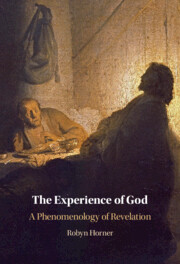Book contents
- The Experience of God
- The Experience of God
- Copyright page
- Contents
- Acknowledgements
- Part I The Problem in Context
- Part II Revelation in Contemporary Philosophy and Theology
- Part III The Event of Revelation
- Chapter 6 A Hermeneutic-Phenomenological Approach to Theology
- Chapter 7 Revelation Exceeds Experience
- Chapter 8 Revelation Affects Experience
- Part IV The Event in Person
- Bibliography
- Index
Chapter 8 - Revelation Affects Experience
from Part III - The Event of Revelation
Published online by Cambridge University Press: 13 October 2022
- The Experience of God
- The Experience of God
- Copyright page
- Contents
- Acknowledgements
- Part I The Problem in Context
- Part II Revelation in Contemporary Philosophy and Theology
- Part III The Event of Revelation
- Chapter 6 A Hermeneutic-Phenomenological Approach to Theology
- Chapter 7 Revelation Exceeds Experience
- Chapter 8 Revelation Affects Experience
- Part IV The Event in Person
- Bibliography
- Index
Summary
In Chapter 8 I examine Lacoste's study of affective experience and consider the possibility that God might be recognised in the affect as an event. For Lacoste, God’s presence to affection takes place in moods rather than feelings. The recognition that God has passed in experience is always subject to self-deception and must be tested against the tradition of the believing community. Revelation and truth are connected by means of Augustine's reversal: when it comes to God, we do not love what we first know but know what we first love. This attends to the paradox that occurs in the reception of phenomena appearing only to freedom – paradoxical phenomena appear as credible rather than indubitable and are open to acceptance or rejection. For Lacoste, such phenomenality ‘cannot be perceived without our decision to see it’ and begins in ‘an experience formed in the element of non-self-evidence’. It arouses love; it is the experience of love that first draws the 'believer'. Revelation touches experience in an encounter that is felt before it is known. Prepredicative, signifying by way of moods rather than feelings, the revelatory encounter is primarily relational rather than doctrinal.
Keywords
- Type
- Chapter
- Information
- The Experience of GodA Phenomenology of Revelation, pp. 152 - 176Publisher: Cambridge University PressPrint publication year: 2022

